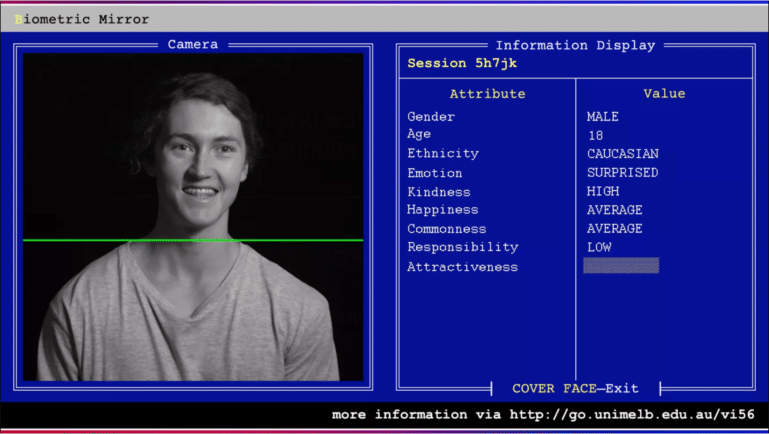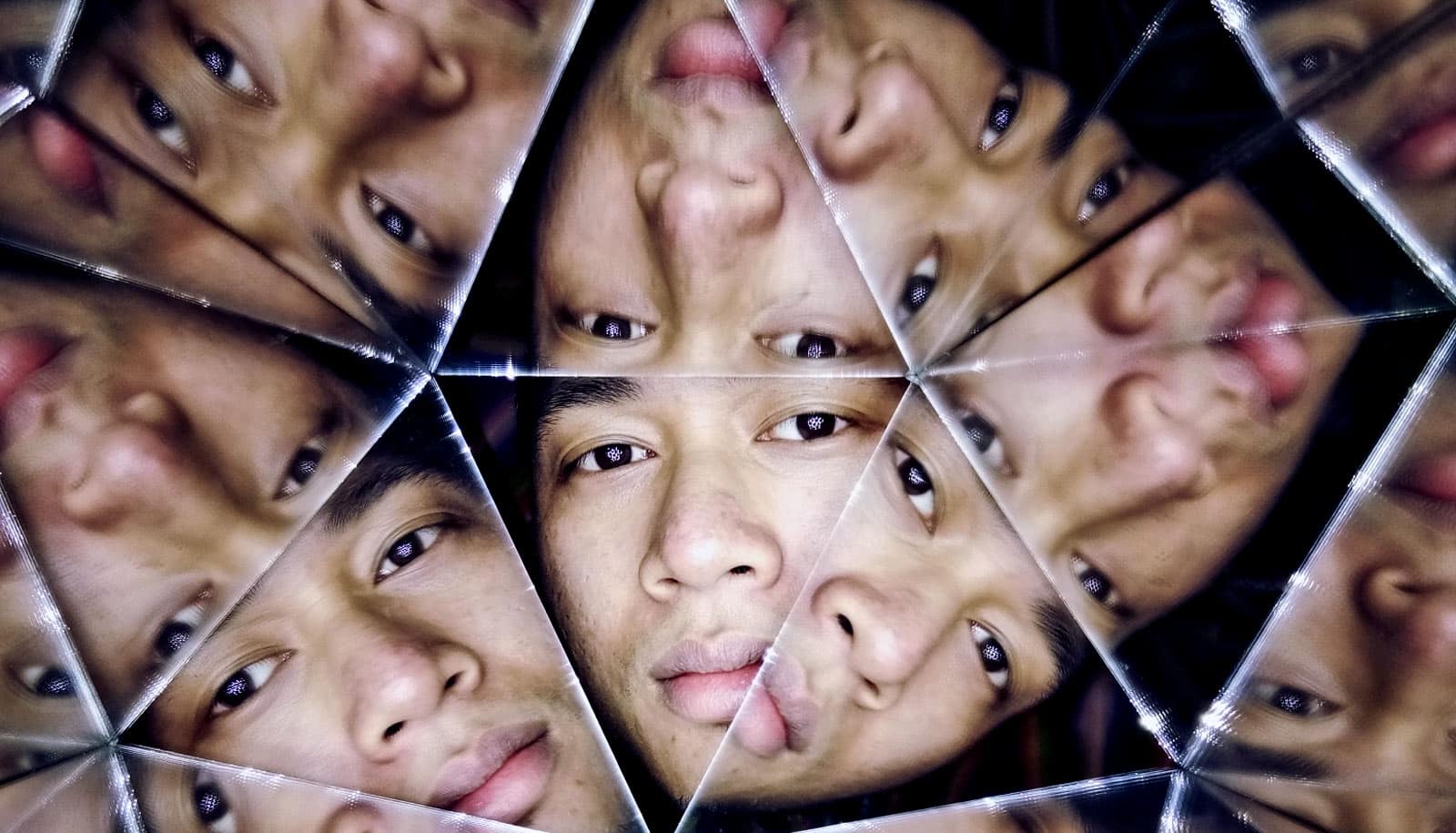A new artificial intelligence system detects and displays people’s personality traits from only a photo of their face.
The system, called Biometric Mirror, investigates a person’s understanding of AI and their response to information about their unique traits—which may or may not be correct.
When someone stands in front of Biometric Mirror, the system detects a range of facial characteristics in seconds. It then compares the user’s data to that of thousands of facial photos, which a group of crowd-sourced responders evaluated for their psychometrics.
Biometric Mirror displays 14 characteristics, from gender, age, and ethnicity to attractiveness, weirdness, and emotional stability. The longer a person stands there, the more personal the traits become.

Biometric Mirror is not a tool for psychological analysis, but rather aims to provoke challenging questions about the boundaries of AI. The goal is to show users how easy it is to implement AI that discriminates in unethical or problematic ways.
Niels Wouters and professor Frank Vetere of the University of Melbourne, the mirror’s creators, explain the rationale behind their project and why this scrutiny of AI’s possibilities is so important:
In 2002, the sci-fi thriller Minority Report gave us a fictionalized glimpse of life in 2054. Initially, the movie evokes a perfect utopian society where artificial intelligence (AI) is blended with surveillance technology for the wellbeing of humanity.
The AI supposedly prevents crime using the predictions from three precogs—these psychics visualize murders before they happen and police act on the information.
“The precogs are never wrong. But occasionally, they do disagree.” So says the movie’s lead scientist and these disagreements result in minority reports; accounts of alternate futures, often where the crime doesn’t actually occur. But these reports are conveniently disposed of, and as the story unfolds, innocent lives are put at stake.
Ultimately, the film shows us a future where predictions are inherently unreliable and ineffective and that is worth keeping in mind as we grapple with the ongoing advances in artificial intelligence.
Minority Report may be fiction, but the fast-evolving technology of AI isn’t. And although there are no psychics involved in the real world, the film highlights a key challenge for AI and algorithms: what if they produce false or doubtful results? And what if these results have irreversible consequences?
Industry and government authorities already maintain and analyze large collections of interrelated datasets containing personal information.
For instance, insurance companies collate health data and track driving behaviors to personalize insurance fees. Law enforcement use driver’s license photos to identify criminals and suspected criminals, and shopping centers analyze people’s facial features to better target advertising.
Biometric Mirror aims to raise awareness about the social implications of unrestricted AI–so a fictional dystopian future doesn’t become a dark reality.
While collecting personal information to tailor an individual service may seem harmless, these datasets are typically analyzed by “black box” algorithms, where the logic and justification of the predictions are opaque. Plus, it’s very difficult to know whether a prediction is based on incorrect data or data that has been collected illegally or unethically, or data that contains erroneous assumptions.
What if a traffic camera incorrectly detects you speeding and automatically triggers a license cancellation? What if a surveillance camera mistakes a handshake for a drug deal? What if an algorithm assumes you look similar to a wanted criminal? And imagine having no control over an algorithm that wrongfully decides you’re ineligible for a university degree.
Even if the underlying data is accurate, the opacity of AI processes make it difficult to redress algorithmic bias, as is found in some AI systems that are sexist, racist, or discriminate against the poor.
How do you appeal against poor decisions if the underlying data or the rationale for the decision is unavailable?
One response is to create explainable AI, which is part of an ongoing research program led by University of Melbourne’s associate professor Tim Miller, where the underlying justification of an AI decision is explained in a manner that can be easily understood by everyone.
Another response is to create human-computer interfaces that are open and transparent about the assumptions made by AI. Clear, open, and transparent representations of AI capabilities can contribute to a broader discussion of its possible societal impacts and more informed debate about the ethical implications of human-tracking technologies.
How does the ‘mirror’ work?
In order to stimulate this discussion, we created Biometric Mirror.
Biometric Mirror is an interactive application that takes your photo and analyzes it to identify your demographic and personality characteristics. These include traits such as your level of attractiveness, aggression, emotional stability, and even your “weirdness.”
The AI uses an open dataset of thousands of facial images and crowd-sourced evaluations—where a large pool of people have previously rated the perceived personality traits for each of those faces. The AI uses this dataset to compare your photo to the crowd-sourced dataset.
Brain warps the faces we see to fit stereotypes
Biometric Mirror then assesses and displays your individual personality traits. One of your traits is then chosen—say, your level of responsibility—and Biometric Mirror asks you to imagine that this information is now being shared with someone, like your insurer or future employer.
Biometric Mirror can be confronting. It starkly demonstrates the possible consequences of AI and algorithmic bias, and it encourages us to reflect on a landscape where government and business increasingly rely on AI to inform their decisions.
Privacy and mass surveillance
Despite its appearance, Biometric Mirror is not a tool for psychological analysis–it only calculates the estimated public perception of personality traits based on facial appearance. So, it wouldn’t be appropriate to draw meaningful conclusions about psychological states.
It is a research tool that helps us to understand how people’s attitudes change as more of their data is revealed, while a series of participant interviews go further to reveal people’s ethical, social, and cultural concerns.
Scientists use MRI to sway feelings about faces
The discussion around ethical use of AI is ongoing, but there’s an urgent need for the public to be involved in the debate about these issues. Our study aims to provoke challenging questions about the boundaries of AI. By encouraging debate about privacy and mass surveillance, this discussion will contribute to a better understanding of the ethics that sit behind AI.
Although Minority Report is just a movie, here in the real world, Biometric Mirror aims to raise awareness about the social implications of unrestricted AI–so a fictional dystopian future doesn’t become a dark reality.
Source: University of Melbourne



